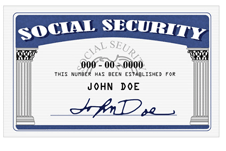What is Social Security and the Benefits for Non US Citizens
Social Security Taxes, Withholding, and Exceptions
When you begin to work in the United States, you will have to obtain a Social Security Number and pay Social Security taxes, just as all Americans do. Social Security taxes are withheld by your employer and submitted to the Internal Revenue Service (IRS) on a frequent, regular basis. If you are self-employed, you are responsible for submitting Social Security taxes to the IRS yourself.
An exception may exist if you are a temporary worker transferred by your international company from a country that has a reciprocal treaty with the U.S. For details, see Social Security Treaties and Agreements to Avoid Dual Tax. Also, some local and state governments have their own retirement and disability plans and do not belong to the Social Security system. Employees of these governments are not in the federal Social Security system.
What Is Social Security, and What Are the Benefits?
What is Social Security? Social security is the broad term for the range of financial benefits available to virtually all workers in America from the U.S. Federal Government. Most workers in the United States rely upon Social Security benefits at some time in their lives. It may be when they retire and collect Social Security retirement benefits; it may be during their working lives if they become disabled and are unable to work (and collect Social Security disability benefits); or they may be eligible for Social Security survivors benefits upon the death of a worker.
Social Security is administered by the Social Security Administration (SSA). The three main programs that they administer are:
- Social Security Retirement Benefits
- Social Security Survivors Benefits
- Social Security Disability Benefits
These three Social Security programs are all funded by payroll tax deductions--that means by every worker in America. (See Social Security Programs: Survivors Benefits, Disability Benefits, and Retirement Benefits). Once you are in the Social Security system, you begin accumulating credits towards future Social Security benefits. Once you are eligible for Social Security benefits, you may apply to the Social Security Administration to receive them.
You may hear someone say, "I'm on disability." That generally means that they are a disabled worker who is collecting Social Security disability benefits. Or you may hear the phrase, "I'm on Social Security." That person is probably a retiree and collecting Social Security retirement benefits.
While most SSA programs are funded from payroll taxes, the SSA does administer a program using general tax funds, called Supplemental Security Insurance (SSI). SSI disability benefits are paid to people who have a disability and who have very few assets and little means of support.
Social Security Benefits for Non-US Citizens, Immigrants, Nonimmigrants
In order to become part of the Social Security system, you must have lawful alien status, permission by the U.S. Citizenship and Immigration Services (USCIS) to work in the U.S., and a Social Security Number. (See How to Apply for a Social Security Number or Card, Get SSN Application)
There is a Social Security Administration office in almost every city or county in the U.S. You may find your nearest SSA office using the online Social Security Office Locator, or by calling the Social SecurityAdministration's national toll-free number: 1-800-772-1213. For common questions, see Social Security FAQ - Benefits After 10 Years of Work and More.
How Much Are My Social Security Taxes? How Are They Calculated?
Social Security taxes, also known as FICA (Federal Insurance Contribution Act) are usually withheld from your salary. As an employee, you are taxed 7.65%, which covers both Social Security and Medicare (the government health insurance program providing coverage to people age 65 and over).
The Social Security part of the tax is 6.20% of gross wages (wages before any deductions) up to $76,200. The Medicare tax is 1.45% of all earnings.
Your employer is required to contribute an additional 7.65% to match your contribution. If you are self-employed, you pay Social Security taxes equal to the combined employee/employer tax (15.3%), which you must remit to the Internal Revenue Service (IRS) on a regular basis (although half of this tax is deductible as a business cost).
How Are My Social Security Taxes Used?
Generally, out of every dollar paid in Social Security and Medicare taxes: 69 cents goes to a trust fund that pays retirement and survivors benefits; 19 cents goes to a trust fund that pays Medicare benefits; 12 cents goes to a trust fund that pays disability benefits. Your Social Security taxes also pay for administering Social Security. The administrative costs are paid from Social Security trust funds and are less than 1 cent of every Social Security tax dollar collected.
If the Social Security trust funds take in more money than they pay out each month, the reserve funds are then invested in U.S. Treasury bonds, the safest of all possible investments, which earn interest.





